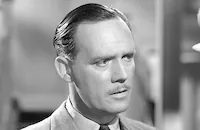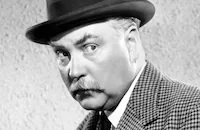Edward G. Robinson was glad to hear that Warner Bros. had loaned him to an English studio for a romantic comedy, Thunder in the City (1937). It gave him a temporary respite from the Warner gangster ghetto and the chance to show he could handle another genre. Then he read the script. Flat, trite, stereotype-ridden, he told the English studio execs. They agreed, but did nothing. Then Robinson ran into a friend, the prize-winning playwright, screenwriter and Algonquin Round Table charter member, Robert E. Sherwood, who was visiting London. He asked Sherwood to do a rewrite. Sherwood did, and is the first of three screenwriters credited. Between his efforts and Robinson's, they raise the film to the level of fair to middling. And more important, snappy and frothy, and how often do you see Edward G. Robinson frothy?
It casts him as a brash, go-getting salesman, a sort of Little Caesar armed with ballyhoo, not bullets, and with a tender side that eventually emerges. His bosses at a car manufacturer think his circus parades and blimps are becoming obsolete, and suggest he go to England to learn to be suave and dignified. He does, but runs into a wall of stereotypes - stuffy English - and is a cliché himself, a loud, upbeat, take-no-prisoners whirlwind of energy, exuberance and innocence and distantly related to an aristocratic family. In no time he's invited for a weekend at the ancestral manor house of a duke and duchess who hope he'll buy their white elephant of a property and get them through the Depression. He also meets Patricia (Viennese-born Luli Deste, with accent to match), the girl who becomes his love interest. Also Ralph Richardson's frosty coiled snake of a banker who becomes his rival on a couple of fronts, offering to bail the family out if Patricia will marry him. Not terribly romantic, she agrees when Robinson's Dan Armstrong hears this, but she says it makes sense.
What doesn't make sense is that the family has been sitting on some mines in Rhodesia. They're the world's only source of a super-mineral named magnelite. It's lighter than aluminum and stronger than steel and could revolutionize the manufacture of planes, trains and automobiles. The problem is that it would cost millions to extract and refine it, and the family doesn't have millions. The cold banker loves the magnelite more than he loves Pat, but Robinson hatches a plan to get the mineral and the girl. He talks the Duke into giving him 30 days to make it work, forms a company, sells stock in it, and is ready to go. It all hinges on his gaining control of a French scientist's patented way of refining it. As the shenanigans unfold, the American who thinks he's been teaching the Brits, finds himself being taught by them. He's a blunt cards-on-the-table type. The Brits play their social and emotional cards close to the vest, but when they play them, stereotypes recede and real personalities warm the screen and melt the rickety plot.
The real achievement here is how this low-budget enterprise landed so much first-rate talent. Nigel Bruce, who two years later was to join Basil Rathbone (than whom he was younger by two years) as the bumbling Dr. Watson in the series of Sherlock Holmes films for which both are best remembered, had long had a hammerlock on genial but dim blunderers, none too bright, but with hearts of oak. Here his only real passion is dart games, and he's made funnier by the way he's constantly helicoptered by his wife, the Duchess, played with regal authority, then heartfelt warmth by that beloved grande dame of stage and screen, Constance Collier, whose career spanned six decades. Deste's out of place Viennese accent (explained by saying that she spent a lot of time in Vienna) actually is an asset, too, and Richardson, whose measured performance, with its undercurrent of smugness, never raises his voice or lowers his bright, beady, acquisitive eyes. It's a pleasure to watch them work under Marion Gering's brisk, efficient direction.
In the end, the performers sell us on this silly material, refusing to not let it ever be more than passably entertaining. Film history is littered with the remains of inadequate material that couldn't be brought to life with superb actors. This is one of the ones that is, a victory for unpretentious let's get-on-with-it filmmaking. Although Robinson plays a high-energy guy, he doesn't play his role for laughs, but delivers in a more even-keeled fashion, like the Brits he's sent to learn from. He's almost softly naturalistic, nicely underplaying the emotional dimension that couldn't survive anything but a light touch. If he wanted to prove he could adapt to comedy, he did. Too bad he didn't try a few more. The project, beating the odds and landing on its feet, had a real-life happy ending, too. It was while in London that Robinson bought his first two paintings, beginning an off-screen life as a passionate art collector.
By: Jay Carr
Thunder in the City

Brief Synopsis
A visiting American engages in a bold business promotion, the likes of which the British have not seen.
Cast & Crew
Read More
Marion Gering
Director
Edward G. Robinson
James Carew
Arthur Wontner
Annie Esmond
Cyril Raymond
Film Details
Genre
Comedy
Drama
Release Date
1937
Technical Specs
Duration
1h 16m
Sound
Mono (Western Electric Wide Range Noiseless Recording)
Color
Black and White
Theatrical Aspect Ratio
1.37 : 1
Synopsis
Dan comes to England to learn more sedate business practices. While there he becomes involved in a scheme to exploit mangalite mines in Rhodesia. He and Manningdale become rivals for Patricia.
Director
Marion Gering
Director
Videos
Movie Clip



Film Details
Genre
Comedy
Drama
Release Date
1937
Technical Specs
Duration
1h 16m
Sound
Mono (Western Electric Wide Range Noiseless Recording)
Color
Black and White
Theatrical Aspect Ratio
1.37 : 1
Articles
Thunder in the City

Thunder in the City
Edward G. Robinson was glad to hear that Warner Bros. had loaned him to an English studio for a romantic comedy, Thunder in the City (1937). It gave him a temporary respite from the Warner gangster ghetto and the chance to show he could handle another genre. Then he read the script. Flat, trite, stereotype-ridden, he told the English studio execs. They agreed, but did nothing. Then Robinson ran into a friend, the prize-winning playwright, screenwriter and Algonquin Round Table charter member, Robert E. Sherwood, who was visiting London. He asked Sherwood to do a rewrite. Sherwood did, and is the first of three screenwriters credited. Between his efforts and Robinson's, they raise the film to the level of fair to middling. And more important, snappy and frothy, and how often do you see Edward G. Robinson frothy?
It casts him as a brash, go-getting salesman, a sort of Little Caesar armed with ballyhoo, not bullets, and with a tender side that eventually emerges. His bosses at a car manufacturer think his circus parades and blimps are becoming obsolete, and suggest he go to England to learn to be suave and dignified. He does, but runs into a wall of stereotypes - stuffy English - and is a cliché himself, a loud, upbeat, take-no-prisoners whirlwind of energy, exuberance and innocence and distantly related to an aristocratic family. In no time he's invited for a weekend at the ancestral manor house of a duke and duchess who hope he'll buy their white elephant of a property and get them through the Depression. He also meets Patricia (Viennese-born Luli Deste, with accent to match), the girl who becomes his love interest. Also Ralph Richardson's frosty coiled snake of a banker who becomes his rival on a couple of fronts, offering to bail the family out if Patricia will marry him. Not terribly romantic, she agrees when Robinson's Dan Armstrong hears this, but she says it makes sense.
What doesn't make sense is that the family has been sitting on some mines in Rhodesia. They're the world's only source of a super-mineral named magnelite. It's lighter than aluminum and stronger than steel and could revolutionize the manufacture of planes, trains and automobiles. The problem is that it would cost millions to extract and refine it, and the family doesn't have millions. The cold banker loves the magnelite more than he loves Pat, but Robinson hatches a plan to get the mineral and the girl. He talks the Duke into giving him 30 days to make it work, forms a company, sells stock in it, and is ready to go. It all hinges on his gaining control of a French scientist's patented way of refining it. As the shenanigans unfold, the American who thinks he's been teaching the Brits, finds himself being taught by them. He's a blunt cards-on-the-table type. The Brits play their social and emotional cards close to the vest, but when they play them, stereotypes recede and real personalities warm the screen and melt the rickety plot.
The real achievement here is how this low-budget enterprise landed so much first-rate talent. Nigel Bruce, who two years later was to join Basil Rathbone (than whom he was younger by two years) as the bumbling Dr. Watson in the series of Sherlock Holmes films for which both are best remembered, had long had a hammerlock on genial but dim blunderers, none too bright, but with hearts of oak. Here his only real passion is dart games, and he's made funnier by the way he's constantly helicoptered by his wife, the Duchess, played with regal authority, then heartfelt warmth by that beloved grande dame of stage and screen, Constance Collier, whose career spanned six decades. Deste's out of place Viennese accent (explained by saying that she spent a lot of time in Vienna) actually is an asset, too, and Richardson, whose measured performance, with its undercurrent of smugness, never raises his voice or lowers his bright, beady, acquisitive eyes. It's a pleasure to watch them work under Marion Gering's brisk, efficient direction.
In the end, the performers sell us on this silly material, refusing to not let it ever be more than passably entertaining. Film history is littered with the remains of inadequate material that couldn't be brought to life with superb actors. This is one of the ones that is, a victory for unpretentious let's get-on-with-it filmmaking. Although Robinson plays a high-energy guy, he doesn't play his role for laughs, but delivers in a more even-keeled fashion, like the Brits he's sent to learn from. He's almost softly naturalistic, nicely underplaying the emotional dimension that couldn't survive anything but a light touch. If he wanted to prove he could adapt to comedy, he did. Too bad he didn't try a few more. The project, beating the odds and landing on its feet, had a real-life happy ending, too. It was while in London that Robinson bought his first two paintings, beginning an off-screen life as a passionate art collector.
By: Jay Carr




















